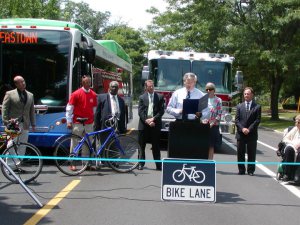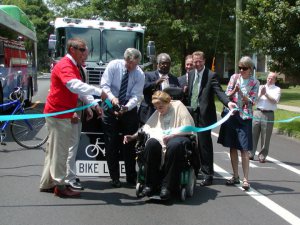You are currently browsing the monthly archive for July 2010.
Legislation Headed to Governor’s Desk
In a move that will make transportation more accessible to all residents, the House and Senate today passed Complete Streets legislation (HB 6151 & HB 6152) sponsored by State Representatives Pam Byrnes (D-Lyndon Township) and Jon Switalski (D-Warren) to ensure that future transportation plans statewide take into consideration the needs of all users including pedestrians, bicyclists, seniors, people with disabilities and children. This plan is now set to be signed into law.
HB 6152 passed out of the Senate unanimously while 6151 was passed unanimously after an amendment was introduced upon the request of MDOT*. Later in the day the House then took up HB 6151 again for a vote of concurrence where it passed by a margin of 76 to 21. The proposed CRAM amendment to eliminate Michigan’s 32 year commitment to mandatory nonmotorized funding did not receive any legislative support due in part by efforts of Coalition partners such as the League of Michigan Bicyclists and Michigan Trails and Greenways Alliance.
“I’m very pleased with the Senate’s quick action on this legislation,” said Byrnes, Chair of the House Transportation Committee. “I was able to work across the aisle and across the dome to deliver a meaningful change for Washtenaw County and for Michigan. This legislation is good for the environment, good for the economy and promotes healthier lifestyles for our residents. It’s a win for everyone.”
Under this legislation, the Michigan Department of Transportation will be required to consider all users of our roads in all phases of road project planning, developing and constructing. The plan will also encourage local units of government to consider Complete Streets principles when updating their master plans. While Complete Streets accommodations may vary between communities, they include sidewalks, bike lanes, special bus lanes, accessible transit stops, frequent crossing opportunities and accessible pedestrian signs. A statewide Complete Streets Advisory Council will also be formed under this legislation.
Complete Streets planning also presents an opportunity to increase the safety and availability of travel options for seniors – a need that will increase as the Baby Boomers age.
“Transportation planning is crucial to revitalizing our downtowns and creating the atmosphere to attract businesses, create jobs and keep our young people here in Michigan,” Switalski said. “Providing people with safe alternative travel options will lead to healthier lifestyles and give residents more ways to reach the small businesses that drive our economy. This Complete Streets legislation reflects the bipartisan effort it takes to build a brighter future for Michigan.”
In 2009, Michigan had the 9th highest rate of adult obesity in the nation, at 28.8 percent, and the 26th highest rate of overweight youths (ages 10 – 17) at 30.6 percent, according to a report by Trust for America’s Health and the Robert Wood Johnson Foundation. If that trend continues, the prevalence of obesity will grow to 44 percent by 2018.
“The Senate’s approval of the Complete Streets legislation is a testament to the importance of creating walkable and bikeable communities where residents have the opportunity to lead healthy, active lifestyles,” said Mike Maisner, Legislative Committee Chair Healthy Kids, Healthy Michigan.
Complete Streets have many benefits, including, increased property values, reduced risk of pedestrian-vehicle crashes and increased pedestrian traffic.
Detroit, Saline, East Lansing, Houghton, Marquette Charter Township, Flint, Linden, Ferndale, and Jackson are currently working on local Complete Streets policies. More than 120 jurisdictions have adopted Complete Streets policies nationwide, including nearly 35 communities in the past two years.
The Michigan Complete Streets Coalition would like to thank all advocates who have supported this initiative!
* MDOT Amendment:
Senator Gilbert offered the following amendments to House Bill No. 6151 (S-2):
1. Amend page 8, line 16, after “DUTIES.” by inserting “FAILURE TO COME TO AN AGREEMENT SHALL NOT PREVENT THE DEPARTMENT FROM SUBMITTING ITS MULTIYEAR CAPITAL PLA…N TO THE COMMISSION.”.
2. Amend page 12, line 3, after “PROCEEDINGS” by inserting a comma and “A STATEMENT OF INSTANCES IN WHICH THE DEPARTMENT AND A MUNICIPALITY WERE UNABLE TO AGREE UNDER SUBSECTION (3) ON A DEPARTMENT PROJECT AFFECTING A ROADWAY OR TRANSPORTATION FACILITY WITHIN OR UNDER THE JURISDICTION OF THE MUNICIPALITY,”.
The Department requested the above amendment to HB 6151 due to concerns over holding up funding for 5 year transportation plans if an agreement could not be reached between MDOT and a municipality regarding specific complete streets projects in that plan. Any projects without an agreement will be pulled out of the 5 year plan and will be dealt with separately, probably with the Transportation Commission essentially becoming a mediator. There is obviously still a bit of gray area regarding this amendment that the new Advisory Council, which has numerous Michigan Complete Street Coalition members on, will have to clarify down the line and in the actual drafting of the MDOT Complete Streets policy. The advocates that were at the Capitol today came to consensus that the amendment was relatively benign as long as we clarify what happens to those projects that get pulled out of the 5 year plan. In some cases it could actually help locals slow down a project if they felt like MDOT was pushing something forward that locals are not happy with. At the same time, it could potentially also unnecessarily slow good projects as well.
Media Coverage:
- Grand Rapids Free Press
- AnnArbor.com
- Interlochen Public Radio
- Grand Vision Blog
- Michigan Environmental Council Press Release
- Spinal Column Blog
- Great Lakes Echo
- Heritage.com
- The Times Herald
- South Bend Tribune
- American Council of Engineering Companies
- Metromode
- MDOT Director Steudle’s letter to employees
On Tuesday, July 13, the Coalition attended the Michigan Developmental Disabilities Council’s 2010 Resource Fair. The Fair aimed to connect families and individuals with support services. Approximately twenty organizations/agencies from across the state attended, providing information on services such as Social Security, dentistry, Complete Streets, nutrition, and mental health, among others.
July 13 also marked the 20th anniversary of the American with Disabilities Act, which gives civil rights protections to individuals with disabilities. It guarantees equal opportunity for individuals with disabilities in public accommodations, employment, transportation, State and local government services, and telecommunications. The council held a panel discussion to discuss the Act and its impact.
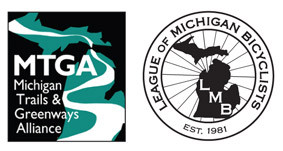 Today, the League of Michigan Bicyclists (LMB) and Michigan Trails and Greenways Alliance (MTGA) submitted a letter opposing a proposed amendment to HB 6151 and 6152 by the County Road Association of Michigan (CRAM). As these Complete Streets bills reach the homestretch of the legislative process, CRAM is seizing this opportunity to attempt changes to Act 51, Section 10k, the only guaranteed source of funding for nonmotorized infrastructure in the state transportation budget.
Today, the League of Michigan Bicyclists (LMB) and Michigan Trails and Greenways Alliance (MTGA) submitted a letter opposing a proposed amendment to HB 6151 and 6152 by the County Road Association of Michigan (CRAM). As these Complete Streets bills reach the homestretch of the legislative process, CRAM is seizing this opportunity to attempt changes to Act 51, Section 10k, the only guaranteed source of funding for nonmotorized infrastructure in the state transportation budget.
As it currently stands, Section 10k requires (as it has for the past 32 years) that 1% of all surface transportation funding in the state transportation budget be allocated to nonmotorized transportation. Eligible projects can include sidewalks in cities and villages, bike lanes, widened shoulders, trails within the road right of way, campaigns for the safety of cyclists on Michigan roads and public education efforts in all jurisdiction that are eligible for transportation funding. This is not a hardship as jurisdictions have ten years in which to accumulate and spend these funds. It should also be noted that nonmotorized facilities, such as bike lanes and wide shoulders, have been proven to extend the life of our roads by protecting their edges.
While CRAM has made it clear from day one that they oppose these bills, they have chosen not to express their opposition publicly and instead have stated both in the House and Senate that they support these bills “in concept only.” Their last-minute attempt to tack on an unrelated issue to bills that have seen overwhelming nonpartisan support in both the House and Senate as well as the general public is certainly unfortunate to say the least.
HB 6151 and 6152 will soon be up for a vote on the Senate floor, possibly as soon as tomorrow, July 28th. We are asking all Complete Streets supporters to voice support for these bills to your State Senator and express opposition to CRAM’s efforts to eliminate mandatory nonmotorized funding in Michigan. A few bulleted concerns regarding CRAM’s ammendment are below and the letter of opposition by LMB and MTGA can be read here.
Concerns with CRAM Amendment:
- MDOT does not have the ability to leverage the large variety of different funding sources to satisfy the 1% requirement making it no longer a level playing field.
- Creates an environment of “haves, and have nots” among local road agencies. Some communities may not have the capacity, know how, or resources to leverage other sources of funding.
- Utilization of other funding sources may create challenges associated with auditing, reporting enforcement of compliance by MDOT and the Michigan Department of Treasury.
- Utilizing other sources may create issues associated with ensuring the funding is being used for appropriate non-motorized facilities.
- Current nonmotorized funding needs far exceed the current 1% requirement which means they should be using all other available funds to match or leverage the 10k investment - NOT replace it!
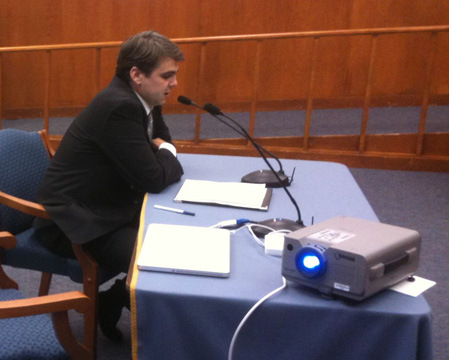
Sean Mann of Let's Save Michigan discussing the economic benefits for communities that adopt Complete Streets policies.
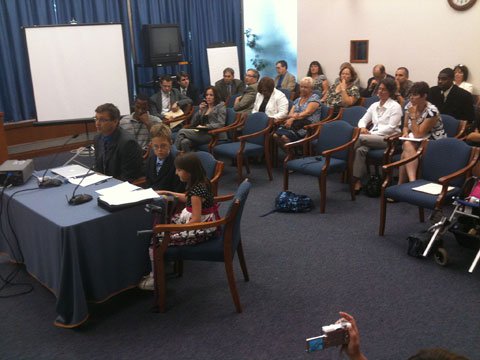
- Katie Birchmeier (10), Conor Waterman (9) and James Kleimola (18) testify in support of Complete Strees with PEAC’s John Waterman.
Complete Streets legislation, H.B. 6151 and 6152, passed* unanimously out of the Senate Transportation Committee today! The Committee had only planned on taking testimony today, but we must have won them over with a packed room, an overflowing table of written testimony and numerous articulate, well-spoken supporters. The bills will now move on to the Senate floor for a full vote.
The room was once again packed with advocates who voiced their support for Complete Streets, including organizations such as SEMCOG, Let’s Save Michigan, Mid-Michigan Environmental Action Council (Mid-MEAC) and AARP Michigan to local citizens like Lyndon Babcock and Michelle Miles. After hearing children from the Program to Educate All Cyclists (PEAC) testify, Senator Basham commented, “Certainly, Connor, Katie and James helped me make up my mind.”
The League of Michigan Bicyclists also provided the Committee with a brief powerpoint presentation, on Complete Streets. PDF versions of everyone’s testimony can be found here.
Congratulations to all of our supporters, and a special thank you to those who submitted written testimony and spoke at today’s hearing.
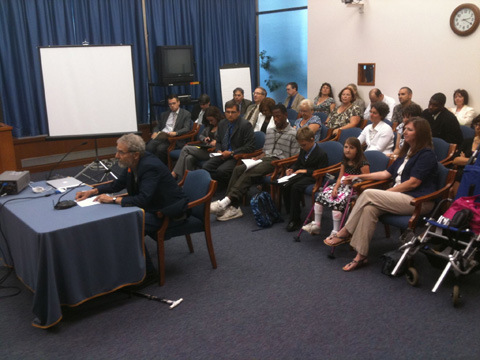
Lansing resident Lyndon Babcock speaks about the need for Complete Streets for people with disabilities.
* The Committee inadvertently excluded H.B. 6152, the second Complete Streets bill in the package, from their vote today. Chairman Gilbert said the committee will discharge H.B. 6152 out of committee with recommendation to the Senate floor.
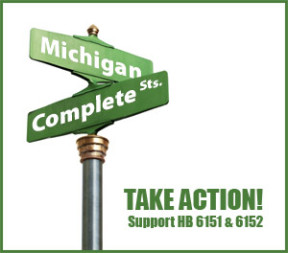 As we reported last week, the Michigan Senate Transportation Committee is taking testimony on Complete Streets legislation (HB 6151 and 6152) this Wednesday, July 21. The hearing will be at 11 am (or immediately following session) in room 100 of the Farnum Building in Lansing. If you are planning to attend or testify, please contact [email protected]. We are asking all Complete Streets supporters to contact Senate Transportation Committee members in support of these bills before Wednesday’s hearing.
As we reported last week, the Michigan Senate Transportation Committee is taking testimony on Complete Streets legislation (HB 6151 and 6152) this Wednesday, July 21. The hearing will be at 11 am (or immediately following session) in room 100 of the Farnum Building in Lansing. If you are planning to attend or testify, please contact [email protected]. We are asking all Complete Streets supporters to contact Senate Transportation Committee members in support of these bills before Wednesday’s hearing.
A sample letter is provided below. Please personalize the message and email it to all five Senators on the Transportation Committee. If you are from the district’s of any of the Transportation Committee members, please make special note of that in your communications.
Senate Transportation Committee Members:
Jud Gilbert (Chair):
[email protected]
(517) 373-7708
Roger Kahn (Vice Chair):
[email protected]
(517) 373-1760
Gerald Van Woerkom:
[email protected]
(517) 373-1635
Raymond Basham (Minority - Vice Chair):
[email protected]
(517) 373-7800
John Gleason:
[email protected]
(517) 373-0142
Sample Letter:
Please personalize
Subject: Support HB 6151 & 6152 - Complete Michigan Streets
Dear Senate Transportation Committee,
I am asking that you support Michigan Complete Streets legislation. House Bills 6151 and 6152 were introduced to encourage communities and road agencies to consider nonmotorized and public transit accommodations to our transportation corridors in state, regional and local planning and implementation processes as a way to create more walkable, bikeable places where children and families can be physically active. The House Transportation Committee unanimously passed the bills, and on the floor of the House of Representatives the bills received overwhelming support. HB 6151 passed with a vote of 85 to 21 and HB 6152 passed 84 to 22.
Complete streets policies ensure that infrastructure is designed and operated to enable safe access for all users. Pedestrians, bicyclists, motorists and transit riders of all ages and abilities can move safely along and across a complete street. There is no prescription for what a Complete Street looks like. A Complete Street in a rural area will look different from a Complete Street in a highly urban area, but both are designed to balance safety and convenience for everyone using the road.
Complete Streets boost the economy by increasing residential property values because homeowners are willing to pay more to live in walkable communities and businesses located along Complete Streets often see an increase in sales. Complete Streets improve safety and reduce crashes by providing pedestrian and bicycle infrastructure, such as safe crossings, sidewalks, or on-road bicycle lanes. Complete Streets promote public health by making it safe and convenient for children and families to incorporate physical
activity into their daily lives as a way to combat the obesity epidemic. Clearly, supporting Complete Streets is investing in a stronger and healthier Michigan.
I urge you to vote in favor of the Michigan Compete Streets Bills. Together we can create a more vibrant Michigan.
Sincerely,
Your Name
Your Organization
123 Your St.
Yousville, MI 12345
Phone: (123) 456-7890
The Michigan Senate Transportation Committee is taking testimony on our Complete Streets bills on Wed. July 21. The hearing will be at 1pm in room 100 of the Farnum Building in Lansing. If you are planning to attend or testify, please contact [email protected]. We’ll be posting more information shortly with information about how to contact your Senator.
 Editorial: Michigan lawmakers should approve Complete Streets bill to focus on more than motorists
Editorial: Michigan lawmakers should approve Complete Streets bill to focus on more than motorists
The Michigan Complete Streets Coalition would like to sincerely thank the Grand Rapids Editorial Board for their vocal support for Michigan Complete Streets legislation currently before the State Senate. We couldn’t agree more that, “Michigan can and should do better” and that “It’s time for the state to motor toward smarter transportation planning.”
Visit the M-Live website to read their fantastic editorial.
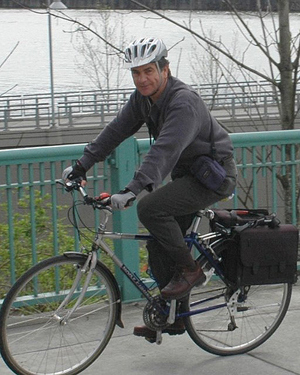 National bicycle and pedestrian expert, Michael Ronkin, was yesterday’s keynote speaker at the Michigan Transportation Planning Association and Michigan Association of Regions conference titled “Planning for Change in an Uncertain World.” The 34th annual conference started on July 13 and will conclude on the 16 and is being held in East Lansing.
National bicycle and pedestrian expert, Michael Ronkin, was yesterday’s keynote speaker at the Michigan Transportation Planning Association and Michigan Association of Regions conference titled “Planning for Change in an Uncertain World.” The 34th annual conference started on July 13 and will conclude on the 16 and is being held in East Lansing.
Yesterday’s speakers focused entirely on designing walkable and bike-able communities. Rory Neuner, State Network Manager for the Safe Routes to Schools National Partnership presented on Complete Streets while League of Michigan Bicyclists’ Executive Director Rich Moeller presented a Bikeability Assessment Guide for communities. Additionally, Meridian Township Treasurer, July Brixie highlighted her communities new Bicycle Parking Ordinance while MDOT’s Josh DeBruyn debunked liability concerns many communities have about putting in pedestrian and bicycle facilities. The nonmotorized sessions were rounded out by Dave Morena who discussed Road Diets and Wes Butch of DLZ Corp talked about roundabouts and the need to balance pedestrian mobility against motorist safety.
Following these breakout sessions, Tim Potter, manager of MSU Bikes Service Center, led a group of about 15 bikers on a tour across campus and through E. Lansing and Lansing.
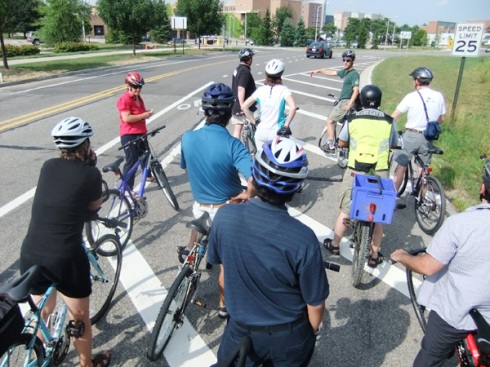 The group of bikers included not only Ronkin and Potter, but also a number of engineers, planners and politicians. Rich Moeller, Executive Director of the League of Michigan Bicyclists, said “It’s different when you see it by bike versus in your car,” “It’s hands-on (and) it allows them to get on their bike and see some of the issues bicyclists are facing. It helps them as planners and engineers to design things.”
The group of bikers included not only Ronkin and Potter, but also a number of engineers, planners and politicians. Rich Moeller, Executive Director of the League of Michigan Bicyclists, said “It’s different when you see it by bike versus in your car,” “It’s hands-on (and) it allows them to get on their bike and see some of the issues bicyclists are facing. It helps them as planners and engineers to design things.”
A short interview with Michael Ronkin was featured in today’s State News.
At a ribbon cutting ceremony on July 13, 2010 Grand Rapids Mayor George Heartwell opened the first Complete Street in Grand Rapids.
Among those present at the event were members of the disability, bicycling and transit communities, as well as the environmentally astute and representatives from the Dyer-Ives Foundation, The Grand Rapids Foundation, and five of Grand Rapids’ seven City Commissioners.
Here is a short video of Mayor Heartwell reading the proclamation that, among other things, expressed strong support for Complete Streets policies.
Other speakers at the event included Kevin McCurren from the Greater Grand Rapids Bicycle Coalition, Clark Goodrich from Concerned Citizens for Improved Transportation/Disability Advocates of Kent County, and Conrad Venema from The Rapid.
Grand Rapidians have expressed a strong desire to improve the walkability of their streets, establish a visible presence for cyclists with bike lanes and paths, and support transit use through various planning initiatives such as the 2002 Master Plan and Green Grand Rapids. Lake Drive is the first street in the city to be officially recognized as a Complete Street because of the addition of new on-street bike lanes and sharrows, pedestrian crossings at every intersection, enhanced bus stops with seating, and newly repaved vehicular travel lanes.
This is great first step in working towards completing Michigan’s streets, thanks and congratulations to Grand Rapids for being a leader on implementing policies that make our communities, and our state, more walkable, bikeable and livable!

Katie Birchmeier (10) and Conor Waterman (9) before adressing the Michigan Disability Caucus on June 23.
On June 23 children with disabilities shared their transportation needs with members of Michigan’s Senate and House. These brave youth addressed the Michigan’s Disability Caucus in the Speaker’s Library of the State Capitol. Katie Birchmeier (10), Conor Waterman (9), James Kleimola (18) and Chris Mistopoulos (25), provided personal stories about their ability to access the community and the challenges they have faced while walking and biking in Michigan.
In addition, PEAC (Programs to Educate All Cyclists) addressed the bi-partisan, bi-cameral Michigan Legislative Disability Caucus. During a one-hour presentation PEAC focused on educating the Caucus about their mission and programs, and advocated for greater state support of cycling by persons with disabilities. PEAC is a Michigan based nonprofit that is recognized as the national leader for cyclists with disabilities.
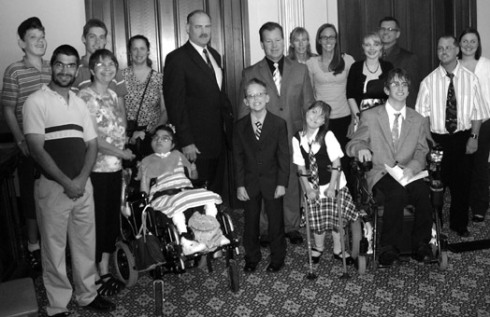
Representative John Gleason and Senator Randy Richarville with PEAC supporters in the Spearker's Library of the State Capitol.
The ability to travel in active modes of transportation is essential to access our community for all individuals. Bicycling can become the primary mode of travel for individuals who cannot get a driver’s license. A key component of the Complete Streets legislation that recently passed the Michigan House, and that is currently being considered by the Senate, is ensuring that streets meet the “varying mobility needs of all legal users of the roadway, of all ages and abilities.” The ability to travel independently is not just an access issue, but an issue of human dignity. Individuals forced to rely on family and friends to meet all transportation needs reinforce ideas regarding inabilities, burden to others and second class citizenship. Clearly, passing Complete Streets legislation would go along way towards establishing a statewide policy regarding equal access issues. Read the rest of this entry »

